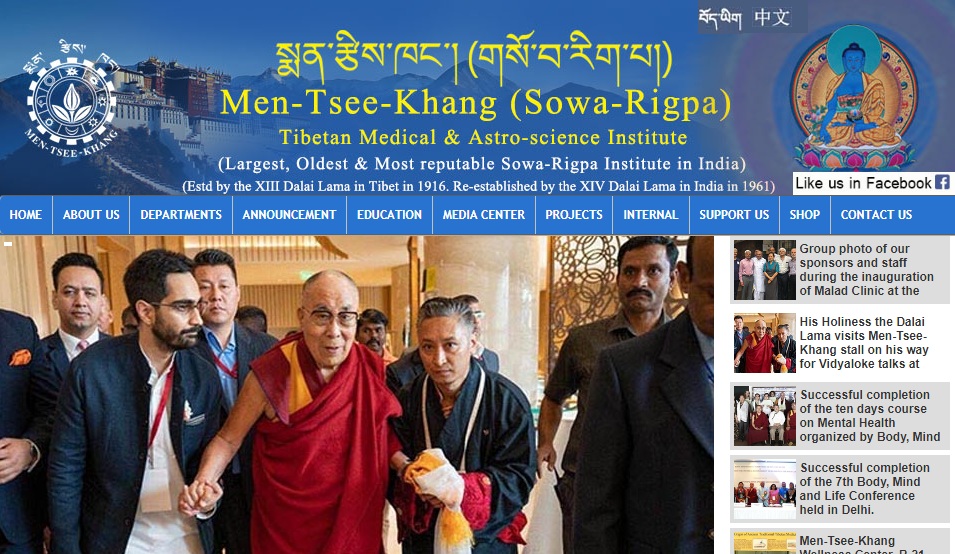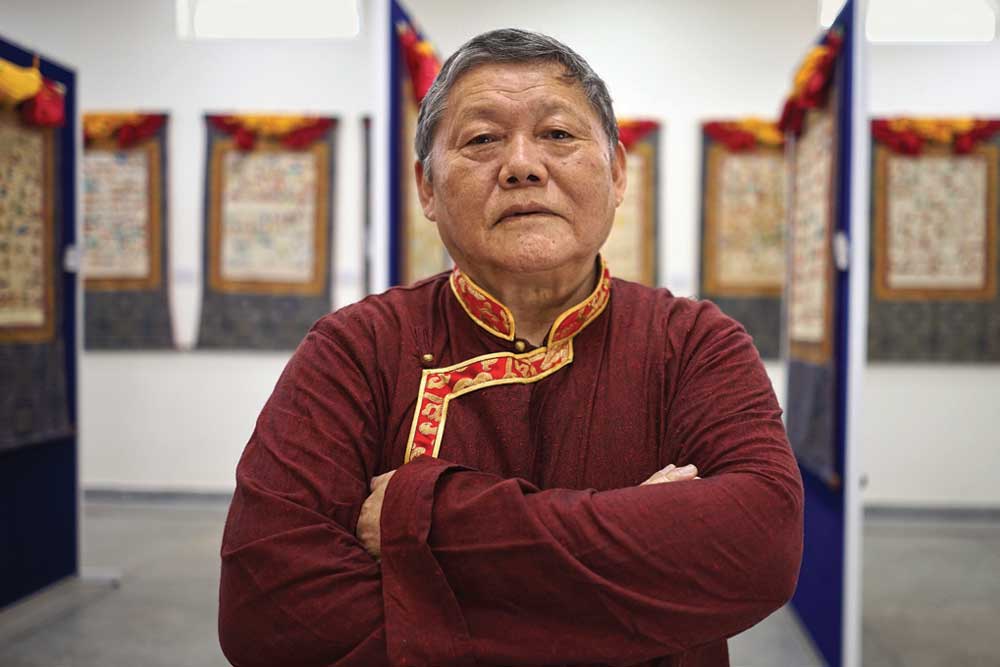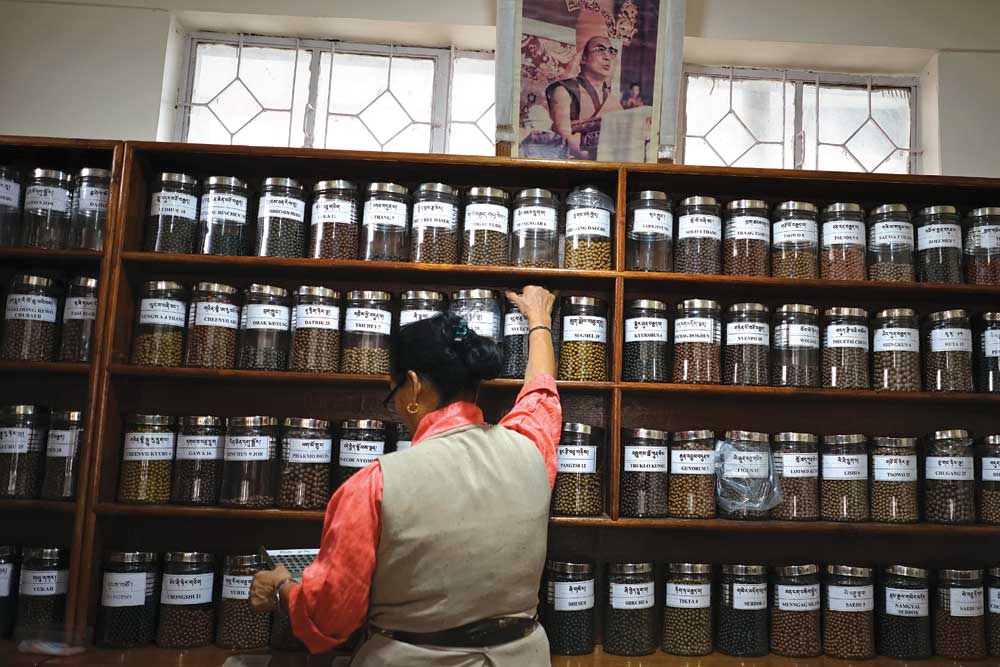
Tashi Tsering Phuri is the Director of Men-Tsee-Khang, the institution whose primary objective is to preserve, promote and revive the traditional system of Tibetan medicine (Sowa Rigpa) and Astro-science. He explains that Men-Tsee-Khang was originally established in Tibet in 1916 by the thirteenth Dalai Lama. Today there are 55 branch clinics throughout India, based at their headquarters in Dharamshala.
Following the Chinese invasion of Tibet and the succeeding attempts by Chinese authorities to suppress Tibetan medicine, His Holiness the Dalai Lama re-established Men-Tsee-Khang in Dharamshala in 1961. It started with one doctor and two students, but His Holiness made a prophecy that within 40 to 50 years Tibetan medicine would be a major force. This prophecy has come to pass and it is now a significant organisation employing 160 doctors and 24 astro-science practitioners alone. The Indian government has recognised Tibetan medicine since 2010 and a growing proportion of product sales is to foreign countries.
China has changed its stance about Tibetan medicine and is now actively promotes it, vying with India for the title of “origin of Tibetan medicine.”
 This is an exciting time for Men-Tsee-Kang. The college is moving to Bangalore. Building of the new facility is almost complete and classes are due to start there in April. The annual intake of doctor students is 40 – 48 and the corresponding astro-science intake is 24. A new five-year course, the Men-Pa Duer-Wa degree for non-Tibetans, is being offered in Dharamshala. It covers Tibetan language, Buddhist Science, medicine and astro-science.
This is an exciting time for Men-Tsee-Kang. The college is moving to Bangalore. Building of the new facility is almost complete and classes are due to start there in April. The annual intake of doctor students is 40 – 48 and the corresponding astro-science intake is 24. A new five-year course, the Men-Pa Duer-Wa degree for non-Tibetans, is being offered in Dharamshala. It covers Tibetan language, Buddhist Science, medicine and astro-science.
His Holiness the Dalai Lama gives strong direction to Men-Tsee-Khang. In 2016 he personally directed Tashi Tsering Phuri to go out more and since then outreaches have been held throughout the world including the United States, Europe and Russia. The Dalai Lama’s emphasis on prevention being better than cure is addressed in 17 booklets on preventative medicine. They were written in Tibetan and are being translated into English. Hindi translations are planned.

Mr Tashi Tsering Phuri, Director of Men-Tsee-Khang
Tashi Tsering Phuri describes the different departments in Men-Tsee-Khang. He describes the College as being like the army that is the practice of Tibetan medicine. The ammunition consists of the medicines provided by the pharmacies.
The Astro-science Department produces various publications such as the annual calendar and astrological readings. They also provide the Astro-science of Natal Horoscope, Astro-science of Marital Compatibility, Astro-science of Obstacle Year, Astro-science of Ill-health, Astro-science of Death and various other minor astrological readings.
The Body, Mind and Life (BML) Department aims to promote mental health issues. An important annual event is the annual BML conference where speakers of different backgrounds such as western medical science, Ayurveda and Tibetan medicine discuss a mental healthtopic. This year’s topic is Nurturing a child’s mental health and the conference will be held in November of this year.

Men-Tsee-Khang Pharmacy
Materia Medica is concerned with the publication of works surrounding the herbs used in Tibetan medicine. It also directs the quality control of herbs used.Herbal Product Research produces natural herbs for a variety of conditions such as headaches, respiratory problems and anaemia. The Documents and Publications Department publishes a variety of books, including those by His Holiness the Dalai Lama.
A great source of pride for Men-Tsee-Khang is their partnerships with the American universities of Madison and Emory. Tashi Tsering Phuri waxes lyrical about their co-operation. An example of this is that the head of Emory taught at Men-Tsee-Khang and went back to the USA with a very positive view of the Institute. Men-Tsee-Khang sends six students to Emory each year. Last year this was not possible because the students’ visas were denied, but they are full of hope that the next group will be able to go.
A major development is the establishment of a pharmacy in South India which is expected to become bigger than the existing ones in Dharamshala and Delhi. The Director notes that 80% of the customers of the branches in cities are Indian, with the remaining 20% being split between foreigners and Tibetans.
He proudly notes that the male:female staff gender ratio is 55:45, and hopes that gender parity will be achieved soon.

Medicine manufacturing area
There are some challenges for Tashi Tsering Phuri. Firstly, there is a shortage of herbs to meet the growing demand. Some herbs are cultivated, but many must be collected in the wild. Bhutan has come forward as a source during the past two years and the supply is expanding.
The second problem is that impostors pass themselves off as experts in Tibetan medicine selling fake remedies. This is something that they are constantly working on.
The expanding product sales to foreign countries has led to a third problem, namely that sometimes the goods fall afoul of customs. When this happens, the goods sometimes are confiscated or are not forwarded or returned.
Tashi Tsering Phuri has been director of the organisation twice, first from 1994 to 1998, and then for the last eight years. He has a finance background and comes across as a man who values hard work and careful organisation. Men-Tsee-Khang certainly appears to be thriving under his leadership.




 Print
Print Email
Email













